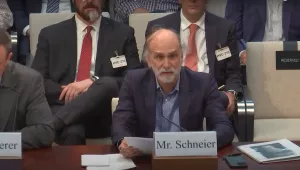Evidently the four-word slogan “No Taxation Without Representation” is too complicated to fit on some people’s bumper stickers. They have chopped off the last two words. They don’t want taxation period.
The “Tea Partiers” revere the Constitution. But some might lack the knowledge of early American history that they claim. In honor of George Washington’s birthday, February 22, I would like to recall a bit of that history.
The Boston Tea Party is not in fact the most appropriate historical precedent for the grass roots protests that have received so much attention over the last year. The famous slogan motivating the patriots in Boston Harbor in 1773 was “No Taxation Without Representation.” But democratic representation was achieved with the American Revolution. The Whisky Rebellion of 1794 is a much closer parallel for today’s protestors. Or the earlier Shays’ Rebellion of 1787, the episode of anarchy to which many Americans reacted by seeking a federal constitution. The pitchfork-carriers in these rebellions were protesting against taxation with representation. They did not want to pay the taxes necessary to fund the government services they enjoyed — which at that time meant servicing the debt from the Revolutionary War. (Sound familiar?) President George Washington, not the rebels, was defending the Constitution against its first severe test, when he personally put down the Whiskey Rebellion with force.
Incidently, the rebels had no appreciation of good public finance theory either, needless to say. Theory urges taxing a beverage the excessive consumption of which imposes high costs on others. Whiskey, rather than tea. President Washington, and his Treasury Secretary, Alexander Hamilton, probably understood that principle. Today, it means taxing fossil fuels more (and payrolls less).
Frankel, Jeffrey. “The Tea Party protestors really mean whiskey, not tea.” February 21, 2011




